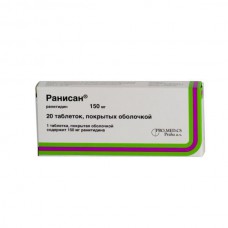Expiration date: 06/2025
The composition and form of issue:
Tablets, film-coated. 1 tablet contains:
ranitidine (as hydrochloride) 75 or 150 mg
excipients: tablets of 75 mg — microcrystalline starch corn copovidone povidone 25 magnesium stearate hypromellose polyethylene glycol 6000 titanium dioxide iron oxide red iron oxide yellow emulsion of simethicone with silicon dioxide
excipients: tablets of 150 mg microcrystalline starch corn copovidone povidone 25 magnesium stearate hypromellose polyethylene glycol 6000 titanium dioxide dibutyl phthalate
in packing contour cell 10 PCs. in cardboard pack 1 (75 mg) or 2 (150 mg) packaging.
Description pharmaceutical form:
Round, biconvex, film-coated tablets almost white, scored on one side. On a break: - fine-grained, nearly white or whitish-cream color.
Pharmacological action:
acid products reduces, inhibits histamine H2-receptors.
Pharmacokinetics:
Well absorbed (food intake of antacids does not affect bioavailability). Poorly crosses the blood-brain barrier, but concentrations in breast milk higher than in plasma of lactating women. Excreted by the kidneys by 70% in an unmodified form.
Indications:
Ulcers disease stomach and duodenal ulcers, reflux-ezofagit, syndrome zollingerellison, diseases, accompanied by high acidity of gastric juice.
Contraindications:
Hypersensitivity, malignancy ulcers.
Application of pregnancy and breast-feeding:
Not recommended.
Side effects:
Headache, dizziness, depression, diarrhea, rash, allergic reactions, transient increase in serum hepatic transaminases. Very rare: reversible leucopenia and thrombocytopenia, bradycardia, hypotension, angioedema, erythema of the skin.
Drug interactions:
Reduces the absorption of phenoxymethylpenicillin.
Method of application and dose:
Inside, regardless of meals, with liquid, squeezed small amount of liquid.
Ulcers disease stomach and duodenal ulcers. For the treatment of exacerbations of 150 mg 2 times a day (morning and night) or 300 mg at night. If necessary — 300 mg 2 times per day. The course of treatment is 4-8 weeks. For the prevention of exacerbations — 150 mg at night.
Ulcers associated with NSAIDs — 150 mg 2 times daily or 300 mg on night for 8-12 weeks. Prevent ulcers when taking NSAID — 150 mg 2 times a day.
Post-operative ulcer is 150 mg 2 times a day for 4 -8 weeks.
Gastroesophageal reflux disease is 150 mg 2 times daily or 300 mg at night. If necessary, the dose may be increased to 150 mg 4 times a day. The course of treatment is 8 to 12 weeks.
Syndrome Zollingerellison. Initial dose 150 mg 3 times a day, if necessary dose can be increased.
Symptomatic treatment of dyspepsia associated with acidity of gastric juice, heartburn, nausea, sour belching etc. for the 75 mg 1-2 times a day.
Prevention of recurrent bleeding — 150 mg 2 times a day.
Prevention of Mendelson's syndrome — a dose of 150 mg 2 hours before anaesthesia, and preferably 150 mg the previous evening.
Patients with renal insufficiency with Cl creatinine less than 50 ml/min the recommended dose is 150 mg/day.
Precautions:
It is not recommended to use in children.


